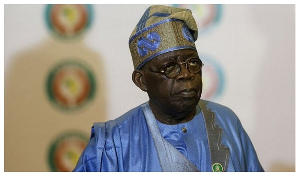General News of Friday, 27 March 2020
Source: theheraldghana.com
Coronavirus: Ghana sends SOS cash requests to IMF
The International Monetary Fund (IMF) has revealed that the Akufo-Addo government, has sent a special request for money to help the country address the economic impact of the COVID-19 pandemic.
A statement issued by the IMF’s Communications Department yesterday said “Last week, the IMF received Ghana’s request for a disbursement under the Rapid Credit Facility to help the country address the economic impact of the COVID-19 pandemic. We are working hard to evaluate the authorities’ request and bring it forward for Executive Board consideration as soon as possible.”
The information, comes amid the controversy surrounding the recently announced US$100 million Coronavirus cash by President Akufo-Addo, which was later discounted by the Finance Minister, Ken Ofori-Atta, as unavailable.
The Funds Press Officer, Lucie Mboto Fouda, yesterday stated that IMF’s African Department director, Abebe Aemro Selassie, made the statement.
It did not mention how much cash the country is requesting for to manage the crisis which has afflicted some 52 people with two people already dead.
IMF Rapid Credit Facility (RCF) provides rapid concessional financial assistance with limited conditionality to low-income countries (LICs) facing an urgent balance of payments need.
The RCF was created under the Poverty Reduction and Growth Trust (PRGT) as part of a broader reform to make the Fund’s financial support more flexible and better tailored to the diverse needs of LICs, including in times of crisis. The RCF places emphasis on the country’s poverty reduction and growth objectives.
If released Financing under the RCF carries a zero interest rate, has a grace period of 5½ years, and a final maturity of 10 years.
About two weeks ago, the Minister for Finance, disclosed that the $100 million devoted by President Akufo-Addo to fight coronavirus pandemic is not yet available.
He said, the government had applied to the World Bank to tap into the $12billion Fast Track COVID-19 Facility for Poverty and the $10billion facility managed by the IMF to address the pandemic.
“The assistance from these two institutions when approved will help close the financing gap,” he stated.
President Akufo-Addo, in an address on Sunday had directed the Finance Ministry to make available $100million to help fight the coronavirus outbreak in Ghana after six cases were recorded.
The amount, according to the President, “is to fund the expansion of infrastructure, purchase of materials and equipment, and public education in the wake of the outbreak.”
But briefing Parliament about the fiscal impact of Covid-19 on Tuesday, March 16, 2020 the Finance Minister, said the government would augment allocations from the two institutions with local resources.
“Measures are being put in place for possible financing of the 2020 budget that will result in the impact of the coronavirus. These measures may include the withdrawal from the Ghana Stabilization Fund.
“We are also discussing with other multilateral and bilateral partners on the potential to close the financial gap. Mr Speaker, even in the global difficult circumstances Ghana is blessed. This honorable house has granted approval to raise $3billion from the Eurobond market for 2020…to support the economy in this dire time.”
“We continue to believe that our land will soon be healed,” he said with much conviction.
He also mentioned that an analysis taken by the ministry shows that the coronavirus is likely to affect the country negatively.
“Mr Speaker, even though the events of the coronavirus is still unfolding, preliminary analysis taken by the ministry shows that the coronavirus will impact negatively on petroleum activities receipts due to the collapse of international crude oil trade, expenditure especially health-related will be affected, travels, International trade, food and nutrition among others,” he indicated.
The Minority, not impressed with the manner in which the Akufo-Addo government is handling the situation, expressed their misgivings.
Former Deputy Finance Minister, Cassiel Ato Forson, argued that the finance ministry, should have given the house details about the $100 million for COVID-19.
“On the $100million dollars, the President had informed us, as a country that he has made available $100 million but the Minister was silent on it. I would have thought that he would have given us a breakdown. What the international donors are saying, where that money is going and where that money is actually coming from,” he stressed.
Also, Member of Parliament for North Tongu Constituency, Sam Okudzeto Ablakwa, in a Facebook post, has said he is disappointed with the said strategy announced by the Finance Minister.
“This is not the level of sincerity, seriousness, and commitment other governments are demonstrating in combating the pandemic. One can now clearly understand why health practitioners of different categories across the nation continue to lament about the lack of basic protective equipment.
“A terribly disappointing news, particularly, from a government espousing a Ghana beyond aid philosophy. We are all determined to rally the nation beyond partisanship to defeat COVID-19, however, a sincerity and credibility deficit on the part of the government as lead actors would undermine genuine consensus and goodwill from all well-meaning quarters,” excerpts of his post reads.
The IMF website, the purpose of IMFRapid Credit Facility is to provide low-access, rapid, and concessional financial assistance to LICs facing an urgent balance of payments need, without ex post conditionality.
It can provide support in a wide variety of circumstances, including shocks, natural disasters, and emergencies resulting from fragility. The RCF also provides policy support and may help catalyze foreign aid.
The RCF is available to PRGT-eligible members that face an urgent balance of payments need, where a full-fledged economic program is either not necessary (for instance because of the transitory and limited nature of the shock) or not feasible (for instance because of capacity constraints or domestic fragilities).
Financial assistance under the RCF is provided as an outright loan disbursement. While RCF financing takes the form of a one-off disbursement., there is scope for repeat use.
A repeat use of the RCF is possible within any three-year period if the balance of payments need is caused primarily by a sudden and exogenous shock or the country has established a track record of adequate macroeconomic policies.
However, no more than two disbursements may be made in any twelve-month period. Repeat use of the RCF may facilitate eventual transition to an ECF arrangement.
Access to RCF financing is determined on a case-by-case basis, taking into account the country’s balance of payments need, the strength of its macroeconomic policies, capacity to repay the Fund, the amount of outstanding Fund credit, and the member’s record of past use of Fund credit.
In addition, it also takes into account the size and likely persistence of the shock.
Under the RCF, access is limited to 50 percent of quota per year and 100 percent of quota on a cumulative basis, with an annual access norm and a per disbursement limit of 25 percent of quota under the “regular” (as opposed to exogenous shock) window and the possibility of up to two disbursements during a twelve-month period.
The RCF also has a higher annual access limit of 80 percent of quota annually and 133.33 percent of quota cumulatively for cases where a member faces urgent balance of payments needs arising from a large natural disaster (that is, which causes damage of at least 20 percent of the member’s GDP).
Fund support under the RCF is provided without ex post program-based conditionality or reviews.
Economic policies supported under the RCF should aim at addressing the underlying balance of payments difficulties and support the country’s poverty reduction and growth objectives.
Concessional lending terms on the cash is that the RCF carries a zero interest rate, has a grace period of 5½ years, and a final maturity of 10 years.












